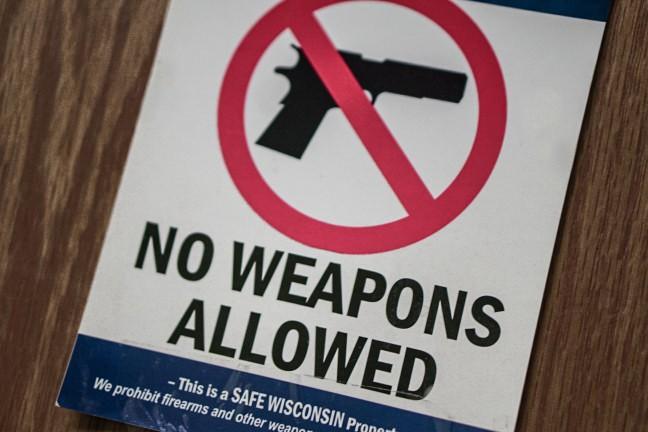Following last month’s fatal shooting in Parkland, Florida, Republican and Democratic lawmakers in Wisconsin clashed in the legislature over how best to address gun violence prevention in the state.
Rep. Jesse Kremer, R-Kewaskum, introduced a bill that would allow individuals licensed to carry concealed weapons to do so in Wisconsin private schools. It did not obtain co-sponsorship by its Feb. 23 deadline.
Following Kremer’s proposal, Rep. Joe Sanfelippo, R-New Berlin, and Rep. Joel Kleefisch, R-Oconomowoc, proposed amendments to a bill which Rep. Terese Berceau, D-Madison, and other Democratic representatives originally introduced.
The legislature voted mostly on party lines, with the majority rejecting a proposal for universal background checks. Instead, lawmakers passed both amendments, banning straw gun purchases — a move recognized as a positive step on both sides of the aisle — and offering funds for armed guards at Wisconsin schools — the more controversial piece of legislation.
In justifying Kleefisch’s amendment regarding additional armed personnel, Sanfelippo posed the question of why schools remain relatively unguarded when every other public venue retains armed security.
“Everything that we consider important or valuable is guarded except schools,” Sanfelippo said. “What we need to do is provide the option for local school districts to hire armed individuals to offer protection because that is the single best line of defense.”
The amendments passed 75-24, with support from all Republicans and 11 Democrats.
Berceau challenged the logistics of the armed guard amendment and said she doubts security personnel presumably armed with a handgun would be able to adequately fend off an intruder wielding an assault or automatic weapon.
Berceau, whose background checks bill had been out for six years, restated her disapproval of the Republican Party’s actions in the state Assembly, which she voiced during the floor session.
“They wanted to be able to say they did something, they just didn’t want to support background checks or any restrictions,” Berceau said. “I said they were acting like blockheads because they won’t budge.”
On the morning of the Assembly floor session, Wisconsin Attorney General Brad Schimel told WTMJ Radio he believed elected officials should discuss the possibility of allowing guns in schools. In response to this, Madison East High School juniors who attended a press conference alongside Democratic officials urged lawmakers to implement stricter gun laws in ensuring their safety and the safety of other students across the state.
Madison East student Annabel Stattelman-Scanlan felt especially discouraged watching as the legislature voted in opposition to the change she and her classmates wished to see.
“I felt hopeful in those moments when we were standing in front and giving our opinions, and then afterward when it actually went to the Assembly it was like all hope was gone,” Stattelman-Scanlan said. “At this point, it just feels like a broken system.”
Teenage activism has risen to the forefront of the gun control debate since the Parkland shooting, with survivors like Emma González and Cameron Kasky emerging as prominent voices leading the Never Again movement. Intent on reforming gun laws, ensuring Marjory Stoneman Douglas is the last mass shooting in America and minimizing the National Rifle Association’s control over politics, the movement has spread across the country, with national school walkouts planned for March 14.
Berceau lauded efforts among the teens taking action in the wake of the Parkland shooting but expressed concern over whether current activism will continue in the future.
“Every time we have something like this, I think it’s going to be different,” Berceau said. “I hope it really is. I hope they don’t get worn down and I hope they don’t get discouraged.”
Madison East High School student Anne Motoviloff, who spoke at the press conference, pondered how the Founding Fathers would react if they were able to see how the Second Amendment has been used to protect a person’s ability to buy a military-grade firearm. In her opinion, they would be disappointed in the government’s prioritization of “political and monetary interests” over the safety of American citizens — which should not be a partisan issue, Motoviloff said.
Despite frustration with how the Legislature, mainly the GOP, has chosen to respond to the Parkland shooting, Motoviloff and her classmates expressed no intention of abandoning their objective of improving gun control.
“It’s kind of just an unacceptable reality and it hits you hardest when people who are in a situation that’s really similar to your own are able to explain what happened to them, and still aren’t being protected by their government,” Motoviloff said. “It’s almost like you have an obligation to act when you realize … that it could’ve been us.”


